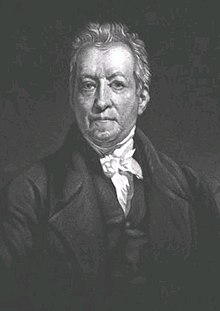James Haldane
| James Haldane | |
|---|---|
 |
|
| Born |
James Alexander Haldane 14 July 1768 Dundee, Scotland |
| Died | 8 February 1851 (aged 82) Edinburgh, Scotland |
| Nationality | Scottish |
| Occupation | Evangelist |
| Spouse(s) | Mary Joass Margaret Rutherford |
| Children | Elizabeth Haldane Catharine Haldane James Haldane Alexander Haldane Mary Haldane Margaret Haldane Robert Haldane Isabella Mitchelson Haldane Daniel Rutherford Haldane Adamina Dundas Duncan Haldane Helen Haldane George Oswald Haldane James Haldane |
| Theological work | |
| Tradition or movement |
Church of Scotland Independent Baptist |
The Rev Cpt James Alexander Haldane (14 July 1768 – 8 February 1851) was a Scottish independent church leader.
The youngest son of Captain James Haldane of Airthrey Castle (who died two weeks before he was born), (his older brother Robert Haldane was also a clergyman) in Stirlingshire, he was born at Dundee.
He was educated first at Dundee Grammar School and afterwards at the High School in Edinburgh and University of Edinburgh. At the age of seventeen he joined the Honorable East India Company as a midshipman on board the ship, the Duke of Montrose. After four voyages to India, in the summer of 1793, he was promoted to the commander of the Melville Castle. He started a careful study of the Bible during his voyages, and also came under the evangelical influence of David Bogue of Gosport, one of the founders of the London Missionary Society.
He abruptly deciding to leave the HEICS to adopt a religious life, and he returned to Scotland in 1793, and began preaching on an itinerant basis, including a "missionary tour" of the northern counties in 1797.
In about 1796 he became acquainted with the celebrated evangelical, Charles Simeon of Cambridge, in whose company he toured Scotland, distributing tracts and trying to awaken others to an interest in religious subjects. In May 1797 he preached his first sermon, at Gilmerton near Edinburgh, with encouraging success. In the same year he established a non-sectarian organization for tract distribution and lay preaching called the Society for the Propagation of the Gospel at Home. During the next few years he made repeated missionary journeys, preaching wherever he could obtain hearers, and generally in the open air.
...
Wikipedia
